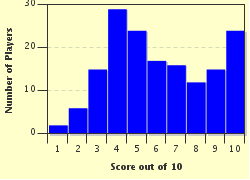Quiz Answer Key and Fun Facts
1. Traditionally, who wrote Deuteronomy?
2. What kind of information does Deuteronomy *typically* contain?
3. Easily the best-known passage in Deuteronomy is what Jews know as the "Shema" or "Sh'ma Yisrael". In the NKJV text it begins with, "Hear, O Israel: The Lord our God, the Lord is one! You shall love the Lord your God with all your heart, with all your soul, and with all your strength." Where in Deuteronomy will you find these two quoted verses?
4. The Lord forbade Moses himself to enter the Promised Land, but He invited Moses to view it from what mountain peak? (Deuteronomy 3:27)
5. What famous Biblical passage is revisited in Deuteronomy 5:1-22? Moses concludes this passage in Deuteronomy with the sentence, "Then he wrote them on two stone tablets and gave them to me." (NIV text)
6. In Deuteronomy 15 instruction is given regarding the general remission of debts every seventh year. What is this practice called in Deuteronomy 15:2? (NKJV text)
7. Moses essentially agrees with what Jesus said: "The poor you have with you always" (John 12:8, NKJV). But, in Deuteronomy 15:11, how does Moses say God wants us to respond to the perpetual presence and the persistent pleas of the poor?
8. Deuteronomy 26:17-19 comprise some of the key verses of the book, being central to its message and purpose.
Which of the following pairs of quotations represent the beginnings of verses 17 and 18? (NKJV text)
9. In Deuteronomy 27:9-26, Moses commands that the people of Israel should have specific curses pronounced over them when they crossed the Jordan from Moab into the Promised Land! How did Moses say that the people should respond to these curses? (eg. according to Deuteronomy 27:16, NKJV text)
10. Deuteronomy 34:10 begins, "But since then there has not arisen in Israel a prophet like Moses, ...". What is the remainder of the verse, uniquely applicable to Moses? (NKJV text)
Source: Author
Rimrunner
This quiz was reviewed by FunTrivia editor
LeoDaVinci before going online.
Any errors found in FunTrivia content are routinely corrected through our feedback system.

